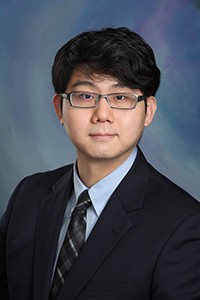 此主题相关图片如下:liu_200x300.jpg
此主题相关图片如下:liu_200x300.jpg

Jia Liu
- Assistant Professor of Bioengineering (as of January 1, 2019)
- Associate in Bioengineering
Professor Liu’s research interests emphasize on the development of novel classes of materials and devices as bioelectronics for use in biological and biomedical applications. Specifically, he is interested in exploring advanced nanoelectronics/photonics, polymer chemistry, tissue engineering and genome engineering to seamlessly integrate man-made devices with living systems for understanding, controlling and, ultimately, enhancing the performance of biological systems through the tissue-electronics interface. His first 5-year focus will be on the development of bioelectronic tools/platforms for mapping and controlling single-cell activities from a significant amount of cells across the entire organs in behaving animals with cell-type specificity. Using these tools, Professor Liu aims to study the relationship between single-cell electrophysiology and gene expression with whole-organ level function/dysfunction to specifically address questions in neuroscience, heart diseases and developmental disorders.
Professor Liu obtained his B.S. degree from Fudan University in China, in 2009, where his research with Prof. Dongyuan Zhao focused on the development of superparamagnetic nanomaterials for bio-imaging. He obtained his Ph.D. degree, along with a short postdoctoral stay, with Prof. Charles M. Lieber at Harvard University in 2014. His Ph.D. thesis focused on the development of tissue-like, silicon-based nano-bioelectronics for nanoelectronics-innervated synthetic tissues and syringe-injectable mesh electronics as a gliosis-free and chronically stable brain probe. He moved to Stanford University in 2015 to work as a postdoctoral fellow with Prof. Zhenan Bao, Prof. Karl Deisseroth and Prof. Anson Lee, where he utilized polymer chemistry and genomic engineering to enable novel electrical interfaces with brain and heart for their activity recording.
Open positions: Perspective students and postdoctoral candidates with background in soft electronics, electrophysiology, genomic engineering, developmental biology, organic synthesis and optics are encouraged to apply. Please contact Prof. Liu by email directly.
刘嘉
生物工程助理教授(As of:2019年1月1日)
生物工程学副学士
刘教授的研究兴趣强调开发新型材料和器件作为生物电子学用于生物和生物医学应用。具体而言,他有兴趣探索先进的纳米电子学/光子学,高分子化学,组织工程和基因组工程,将人造设备与生命系统无缝集成,通过组织电子学界面理解,控制并最终提高生物系统的性能。
他的第一个5年重点是开发生物电子工具/平台,用于绘制和控制来自具有细胞类型特异性的行为动物的整个器官中的大量细胞的单细胞活性,使用这些工具。
刘教授于2009年在中国复旦大学获得学士学位,他与赵东元教授的研究重点是开发用于生物成像的超顺磁性纳米材料。他获得了博士学位。
2014年与哈佛大学Charles M. Lieber教授合作,并获得短期博士后学位。他的博士学位的论文的重点是开发纳米电子 - 神经支配的合成组织的组织样硅基纳米生物电子学和注射器可注射的网状电子学,作为无胶质排异和长期稳定的脑探针。
他于2015年受聘于斯坦福大学,与Zhenan Bao教授,Karl Deisseroth教授和Anson Lee教授一起担任过博士后研究员。在那里他利用高分子化学和基因组工程实现了动物的大脑和心脏活动的采集并创建新型电接口,用于它们活动的记录。
开放职位:鼓励具有软电子学,电生理学,基因组工程,发育生物学,有机合成和光学背景、具有视野洞察力的学生和博士后候选人。请直接通过电子邮件联系刘教授。(中文简)
劉嘉
生物工程助理教授(As of:2019年1月1日)
生物工程學副學士
劉教授的研究興趣強調開發新型材料和器件作為生物電子學用於生物和生物醫學應用。具體而言,他有興趣探索先進的納米電子學/光子學,高分子化學,組織工程和基因組工程,將人造設備與生命系統無縫集成,通過組織電子學界面理解,控制並最終提高生物系統的性能。
他的第一個5年重點是開發生物電子工具/平台,用於繪製和控制來自具有細胞類型特異性的行為動物的整個器官中的大量細胞的單細胞活性。并使用這些工具。
劉教授於2009年在中國復旦大學獲得學士學位,他與趙東元教授的研究重點是開髮用於生物成像的超順磁性納米材料。
他於2014年與哈佛大學Charles M. Lieber教授合作,他獲得了博士學位,並短期獲得博士后學位。
他的博士學位的論文重點是開發納米電子 - 神經支配的合成組織的組織樣矽基納米生物電子學和注射器可注射的網狀電子學,作為無膠質排异和長期穩定的腦探針。
他於2015年移居斯坦福大學,與Zhenan Bao教授,Karl Deisseroth教授和Anson Lee教授一起擔任博士後研究員,在那裡他利用高分子化學和基因組工程實現了动物大腦和心臟的活动的采集并创建了新型電接口,用於它們的活動記錄。
開放職位:鼓勵具有軟電子學,電生理學,基因組工程,發育生物學,有機合成和光學背景的具有視野洞察力的學生和博士後候選人。請直接通過電子郵件聯繫劉教授。(中文繁)



 加好友
加好友  发短信
发短信

 Post By:2018-7-29 17:07:58 [只看该作者]
Post By:2018-7-29 17:07:58 [只看该作者]


 加好友
加好友  发短信
发短信

 Post By:2018-7-29 18:10:10 [只看该作者]
Post By:2018-7-29 18:10:10 [只看该作者]
